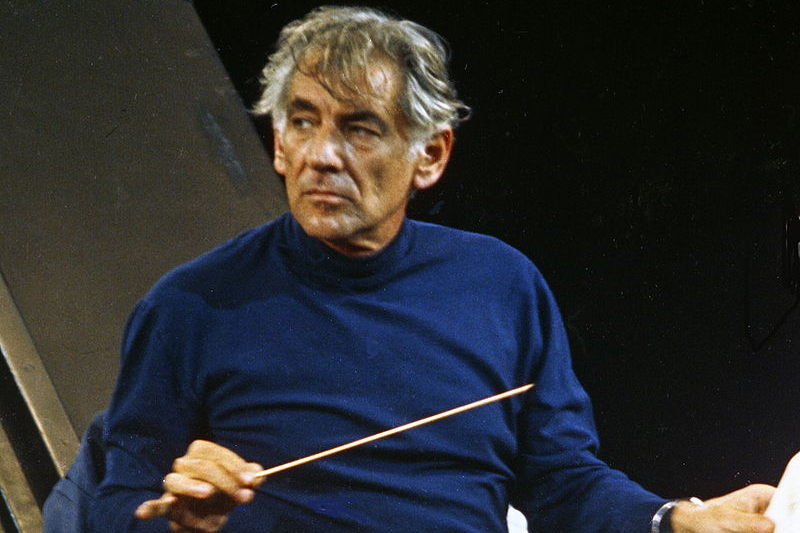America’s Maestro, Leonard Bernstein Posted by Gary Locke on May 10, 2018 in Culture
“I can’t live one day without hearing music, playing it, studying it, or thinking about it.” Leonard Bernstein
A centenary is a celebration to commemorate the 100th anniversary of a significant event, and we are having one right now in the world of music. Leonard Bernstein was born on August 25, 1918. All over the world, especially in the United States, orchestras, radio stations, music festivals, and the recording industry are honoring this spectacularly talented and important figure in the history of music. Many of the world’s most famous conductors of today were directly taught by Bernstein. He was such an influential composer, musician, conductor, and teacher that it is impossible to imagine what music today would be like without him.
Before Bernstein, it was believed that all the great conductors and composers were European. The United States, after all, was a very young country. Its music was not taken seriously. Even the few American orchestras that had any status at all were led by European conductors. And if you were from Asia, Latin America, or Africa? Well, you needn’t bother even contemplating a career in so-called serious music.
Early Years
Bernstein studied at Harvard University, not far from Lawrence, Massachusetts where he was born. While studying at Harvard he met Aaron Copeland, whose compositions Bernstein would champion for the rest of his life. After college, Bernstein lived in New York with his friend Adolph Green, with whom he formed a musical-comedy troupe called The Revuers, performing in clubs in Greenwich Village. His love of performing took shape in those nightclubs.
In 1940, Bernstein began his study at Tanglewood, the Boston Symphony Orchestra’s summer home, under the direction of Maestro Serge Koussevitzky. Copeland was the Composer-in-Residence at Tanglewood that year. Within two years, Bernstein was Koussevitzky’s assistant, and Tanglewood would go on to become Leonard Bernstein’s artistic summer compound for the rest of his life – teaching, conducting, and performing there for 50 years!
Bernstein became famous overnight when, as Assistant Conductor of the New York Philharmonic in 1943, he had to conduct a nationally broadcast concert without any rehearsal because the scheduled conductor became suddenly ill. The review of that concert appeared on the front page of the New York Times the next day, calling it a “warm, friendly triumph”. Bernstein’s fame as a conductor was cemented, and he never stopped being in demand.
Influence
While fame as a conductor might have been enough to give Leonard Bernstein status as one of the great men of 20th-century music, he achieved immortality in his capacity as both a composer and teacher. In 1958, after already becoming the most popular conductor on television, Bernstein began appearing in a CBS series called Young People’s Concerts. They were the most influential, and critically acclaimed, music appreciation broadcasts ever to air. He made 53 of them, from 1958 to 1972, and they have been shown in dozens of countries as well released on DVD.
I won’t bother to list all of Bernstein’s compositions. He composed for orchestras, ballet, opera, and Broadway. I only need to mention one. In 1947, choreographer Jerome Robbins approached Leonard Bernstein and Arthur Laurents about collaborating on a contemporary musical adaptation of Romeo and Juliet. It was to be set in the ethnic, blue-collar neighborhoods of the Upper West Side of New York City. Eventually, they enlisted the talents of a young lyricist named Stephen Sondheim. The result was West Side Story. It is arguably the greatest musical of all time. It is certainly one of the best known and loved.
He was also a humanitarian. He believed that by creating great art, by reminding the world of the possibilities of the human spirit, that we can overcome any opposition to brotherhood and peace. Following the assassination of his friend President Kennedy, Bernstein famously said, “This will be our reply to violence: to make music more intensely, more beautifully, more devotedly than ever before.”
Fame
Bernstein was, far and away, the best-known figure in orchestral music of the 20th century. Nevertheless, much to his consternation, the average person often mispronounced his name. He would correct them by saying, “It is pronounced like the piano that I play. I don’t play a Steenway, I play a Steinway!”
Leonard Bernstein is also a name that we should never forget.
https://youtu.be/Q38ZLodjvwg

Build vocabulary, practice pronunciation, and more with Transparent Language Online. Available anytime, anywhere, on any device.




